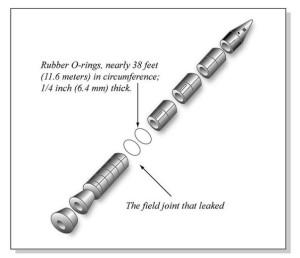
Sometimes, when I consider what tremendous consequences come from small things, I am tempted to think…there are no small things. — Barton
The Space Shuttle Challenger disaster occurred when it broke apart 73 seconds into its flight, leading to the deaths of seven crew members. Disintegration began after an O-ring seal in its right solid rocket booster failed at liftoff. The O-ring failure caused a breach in the SRB joint it sealed, allowing pressurized burning gas from within the solid rocket motor to reach the outside and impinge upon the adjacent SRB aft field joint attachment hardware and external fuel tank.
Details are important.
- Disastrous things can happen when we neglect details — Challenger disaster.
- Great artists are obsessed with details — Ernest Hemingway wrote 47 endings to A Farewell to Arms.
- The health of personal relationships often hinges on small courtesies — a friend called me last week to ask about a project I’m working on; I was so pleased that he remembered.
- When writing, details are essential. There’s a difference between “I’m going to eat, Mom” and “I’m going to eat Mom.”
Charles Eames, the famous American architect and furniture designer, once said, “The details are not the details. They make the design.” Everything is composed of details so every detail is important.
I used to pride myself on my disregard for details, thinking that I was a “big picture” guy who was too concerned with macro issues to worry about micro ones. I was wrong. Being detail-oriented and maintaining a broad view are not mutually exclusive. We can and should do both.
A friend of mine, who was the personal assistant to Mr. Carl Sewell, a successful luxury car dealer in Dallas, told me an interesting story. One day my friend heard Mr. Sewell talking on the phone with the president of General Motors about global issues affecting the automobile industry: financial markets, the price of oil, the impact of China on American automakers, etc. When Mr. Sewell finished the call, he straightaway walked to the parts department and asked, “Have we received the bumper for Ms. Johnson’s Escalade?” Mr. Sewell constantly and successfully negotiated both minutia and massive issues.
Often, big doors swing on small hinges. The space vehicle Mariner 1, destined for Mars, suddenly veered off course and into oblivion. A single hyphen was inadvertently left out of the data fed into its guidance system and that was the cause of its regrettable fate.
[Since we’re talking about details, here’s a detailed description of the error: The error occurred when a symbol was being transcribed by hand in the specification for the guidance program. The writer missed the superscript bar which meant “the nth smoothed value of the time derivative of a radius R”. Since the smoothing function indicated by the bar was left out of the specification for the program, the implementation treated normal minor variations of velocity as if they were serious, causing spurious corrections that sent the rocket off course.]
Pay attention to details.
[reminder]What are you thoughts about this topic?[/reminder]
Summary
What? – Details are important.
So what? – Be detail-oriented. Sweat the small stuff.
Now what? – Analyze yourself. Do you pay attention to details? Become more adept at this. Remember that “close enough” rarely is.
Leaders – Organizational excellence depends on being obsessed with details. Is this part of your organization’s culture?



